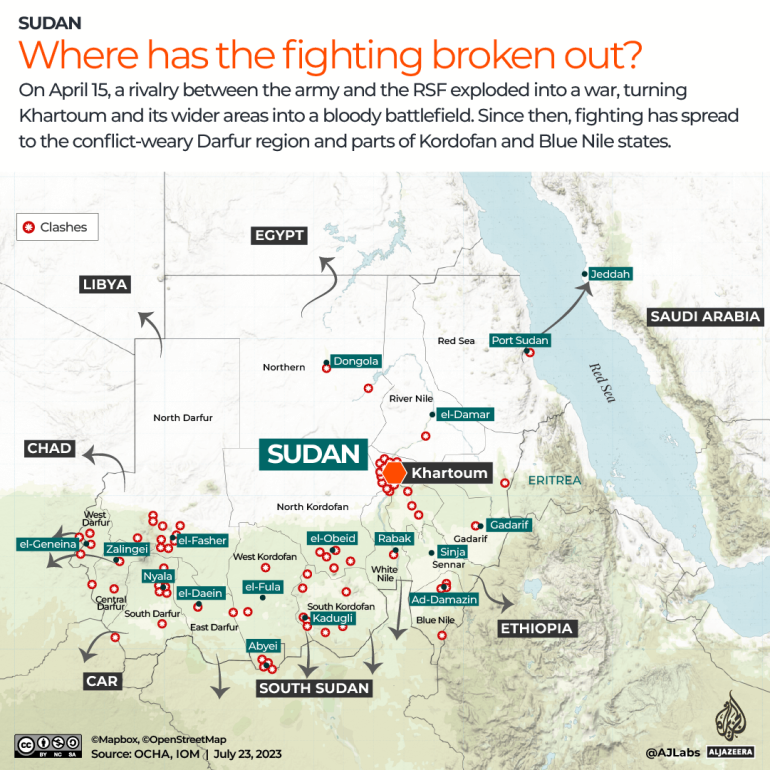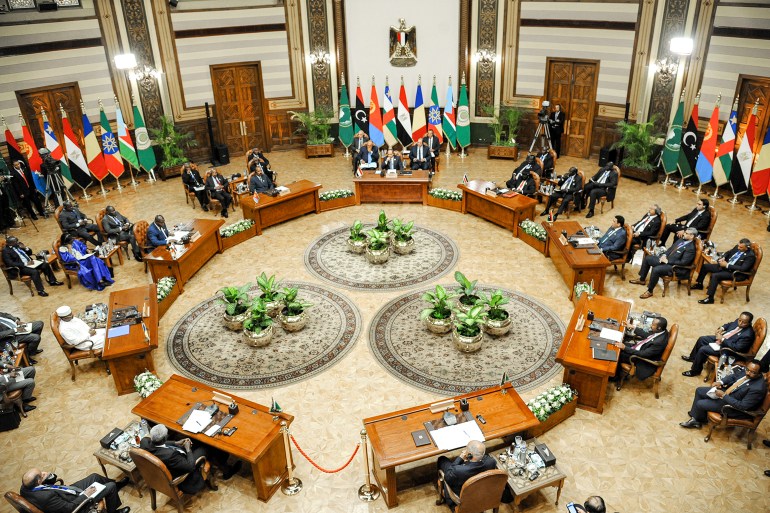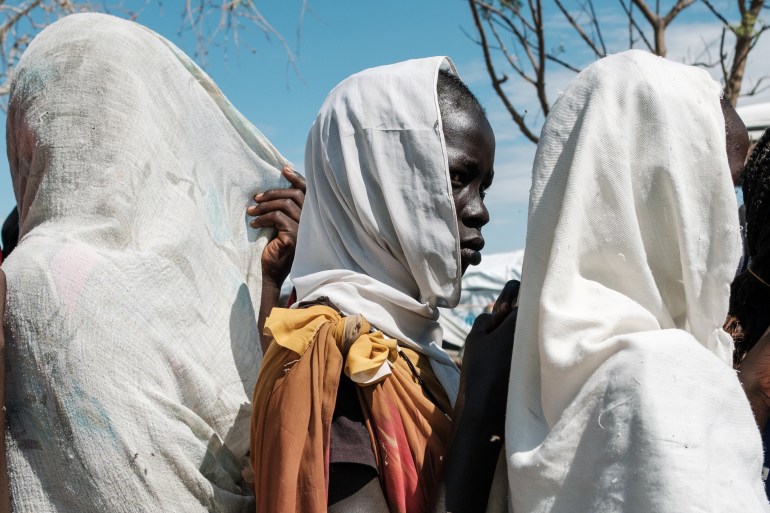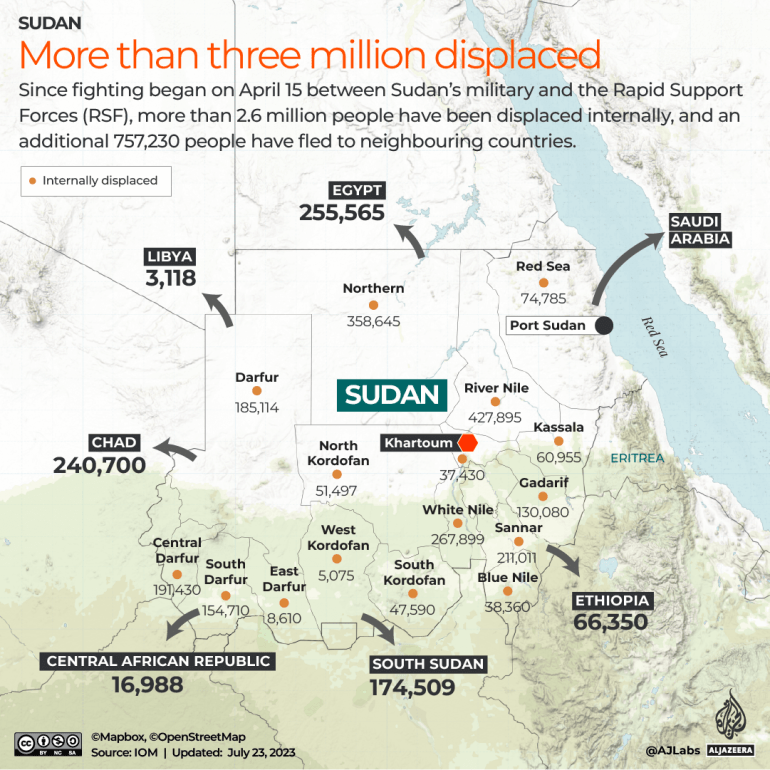Already 100 days of fighting in Sudan, the conflict has taken a devastating human toll, reigniting communal violence and raising fears it could destabilize the wider region.
On April 15, a rivalry between the army and the paramilitary Rapid Support Forces (RSF) erupted into war, turning Khartoum and larger parts of the capital into a bloody battlefield. Since then, fighting has also spread to the conflict-ravaged region of Darfur and parts of the states of Kordofan and the Blue Nile.
A flurry of diplomatic efforts to end the war has yielded no concrete results as the rival sides are engaged in a struggle for survival – one that both believe they can win outright without engaging in meaningful negotiations, analysts say.
What initiatives have been tried so far?
In May, the two warring sides agreed to send negotiating teams to Jeddah, Saudi Arabia, to begin talks brokered by Riyadh and Washington. At least 16 ceasefire agreements followed – every one of which has collapsed.
Negotiations were suspended a month later after the military withdrew its participation, accusing the RSF of a lack of commitment.
Reports suggest talks could resume when the army delegation returns to the Saudi city on July 15, but no official statement has been made so far.
As talks in Jeddah failed and fighting continued, the African Union (AU) unveiled its own plan.
It included the start of a political dialogue between the country’s military, civilian and social actors, not only to resolve the ongoing conflict, but also to establish constitutional arrangements for a transitional period and the formation of a civilian government.
Unlike the talks in Jeddah, the AU summit was attended by members of a civilian coalition that shared power with the military before General Abdel Fattah al-Burhan and General Mohamed Hamdan Dagalo, also known as “Hemedti”, orchestrated a 2021 coup that ended the country’s fragile transition to democracy.
But apart from meeting three times – the last meeting was on June 1 – and making broad statements, the summit has not yet yielded any meaningful results.
Then came the Intergovernmental Authority on Development (IGAD) negotiation effort.
The regional body, made up of eight countries around the Horn of Africa, has set up a quartet committee — including Kenya, Ethiopia, Djibouti and South Sudan — to deal with the Sudanese crisis. But an IGAD meeting on July 10 was boycotted by the army delegation, which accused the quartet’s main sponsor Kenya of lacking impartiality.
Instead, on July 13, the Sudanese army welcomed a summit in the Egyptian capital Cairo, chaired by President Abdel Fattah el-Sisi, with whom Sudan’s top general al-Burhan has longstanding ties. The meeting was attended by leaders from Sudan’s seven neighboring countries, along with the Secretary General of the Arab League and the Chair of the African Union Commission (AUC).
The Egyptian president outlined an initiative to achieve a lasting ceasefire, establish humanitarian corridors for humanitarian aid and build a framework for dialogue that would include all Sudanese political parties.
The round table participants agreed to form a ministerial mechanism, made up of the foreign ministers of the seven states, to resolve the ongoing conflict. The plan was praised by the military and the RSF.

Too little cooperation, too much competition
Having several diplomatic initiatives is not conducive to a solution, experts warn.
“There is a blatant failure of diplomacy here, we see too much competition and too little cooperation,” said Alan Boswell, project coordinator for the International Crisis Group for the Horn of Africa.
“Diplomacy has not been there and this is because it is not high enough on the agenda, especially for the US,” Boswell said, pointing out that Washington has not done enough in its traditional coordinating role.
Disagreements between regional players, which could put pressure on the two warring sides to negotiate a ceasefire, are another obstacle.
The UAE has not been directly involved in a roundtable discussion, and simmering competition with Saudi Arabia could hinder participation in any process.
Also, Cairo’s relations with Abu Dhabi and Addis Ababa have been strained for some time, while Washington enjoyed better times with the UAE, which refused to condemn Russian aggression against Ukraine.
“The existing tensions may prove too much to get everyone to the table,” Boswell said.

Regardless of the number of negotiating platforms, none of the warring parties are genuinely interested in negotiations at this stage, says Kholood Khair, an expert on Sudan and founder of Confluence Advisory.
“They both think they can win and [as long as] both think they can win, they will continue to push militarily, not just to have more bargaining power, but to win outright,” Khair said.
However, both sides have expressed interest in the mediation efforts, not to find a solution, but to buy time while gaining international legitimacy.
“We know they’re rearming, so they’re not engaging in any mediation seriously or in a way that suggests they want to be serious,” Khair said.
Lack of legitimacy
Civilians are in the middle of the conflict.
At least 3,000 people have been killed since the start of the war, according to Sudanese health authorities. Some 2.6 million people are now internally displaced, while more than 750,000 have crossed to neighboring countries, according to figures from the International Organization for Migration.
Save the Children reported “alarming numbers” of teenage girls being raped, involving girls as young as 12.

In Darfur, where the conflict has taken on its own dimension, pitting Arab communities against members of the non-Arab Masalit tribe, more and more testimony and documents describe attacks culminating in ethnic cleansing by Arab fighters alongside members of the RSF, who have denied such allegations.
The fighting in Sudan’s western region has reignited fears of a repeat of the atrocities that took place there in 2003, which killed more than 300,000 people.
The UN Human Rights Office said last week it had credible information that the RSF was behind the murder of 87 people whose bodies were found in a mass grave near el-Geneina, the capital of West Darfur.
While the RSF has a military advantage in areas of active fighting – especially in Khartoum and Darfur – there is ample evidence that its forces are looting homes, looting residential areas and committing sexual violence, rendering the group delegitimized.
On the other hand, the army has shown its inability to fight back the RSF, relying increasingly on allies of the former Omar al-Bashir regime.
“Neither party has the legitimacy to rule Sudan, but you can’t drive them away either,” Boswell said. “We need to see this as a two-step process: negotiations to end the conflict, which then need to transition into a broader political process.”